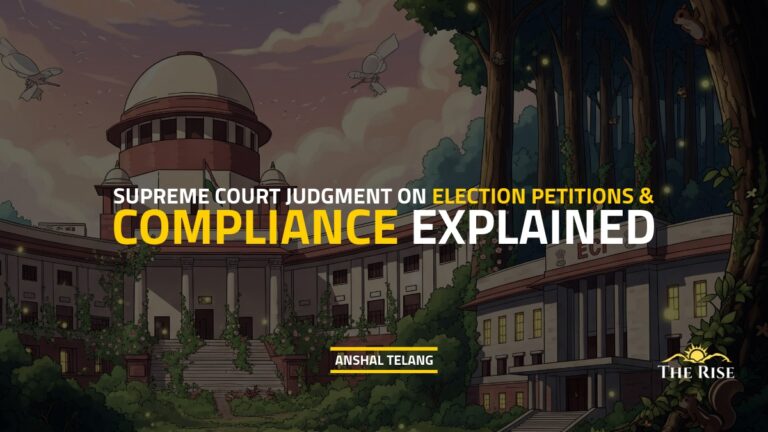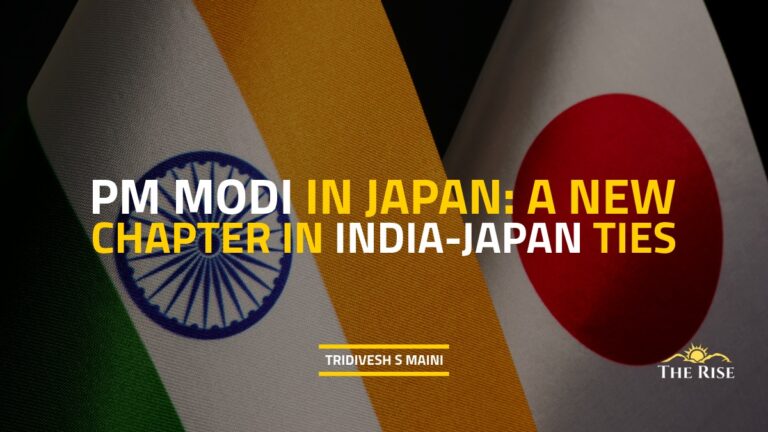In contemporary India, civil society, comprising a diverse array of organizations, movements, and individuals, continues to play a pivotal role in catalysing positive change and confronting the urgent social, economic, and environmental issues facing the nation. As Indian society navigates through complex challenges, civil society’s significance has further intensified, as it responds to the pressing demands for transformative action. This essay delves into the transformative journey of civil society from activism to concrete action, exploring its dynamic response to the present-day issues that require immediate attention and sustainable solutions in the Indian context.
Mobilising Public Opinion and Driving Policy Reform
India’s civil society has grown to be a potent force in influencing public opinion and advancing policy change to solve the nation’s urgent problems. Civil society groups, movements, and people have been crucial in influencing public opinion, increasing awareness, and building a groundswell of support for significant change in a varied and dynamic democracy like India.
The capacity of civil society in India to sway public opinion on a variety of topics, from social injustice and environmental degradation to human rights and governance, is one of its fundamental assets. To engage the public and raise awareness about important problems, civil society organisations use a variety of tactics and venues, such as social media campaigns, grassroots organising, public protests, and advocacy projects. Civil society successfully raises the voices of marginalised populations, draws attention to injustices, and fosters agreement for transformational action through using various channels.
In India, policy transformation has frequently been fueled by the civil society’s mobilisation of the populace. Aiding policymakers create decisions that are receptive to the needs and desires of the populace, civil society organisations interact with them, take part in consultations, and conduct evidence-based research. Civil society actors affect the decision-making process by calling for accountability, openness, and inclusive policy measures and drawing on their knowledge and experience on the ground.
Capacity of civil society in India to sway public opinion on a variety of topics, from social injustice and environmental degradation to human rights and governance, is one of its fundamental assets.
The significance of civil society’s influence in influencing public opinion and its function in advancing policy reform in India is highlighted by a number of important cases. Civil society organisations like the Mazdoor Kisan Shakti Sangathan (MKSS) and the National Campaign for People’s Right to Information (NCPRI) persisted in advocating for the Right to Information (RTI) Act, a landmark piece of legislation that gives citizens access to information and allows them to hold authorities accountable. These organisations were essential in increasing public awareness of the value of openness and pressing for the adoption of a strong RTI framework.
Similarly, efforts promoting environmental sustainability and conservation have been led by civil society organisations. Local grassroots movements and organisations like Greenpeace India have played a significant role in shaping public policy in the fields of renewable energy, resource conservation, and the preservation of environmentally sensitive places.
In India, the role of civil society in influencing public opinion and advancing policy change has grown significantly in recent years. Rapid advancements in digital connection have given civil society new ways to interact with a larger segment of the population, distribute information, and mobilise support for social and policy change. Additionally, as civil society’s importance as a stakeholder in governance is becoming more widely acknowledged, possibilities for communication and cooperation with governmental organisations have emerged, increasing the effect of civil society initiatives.
However, problems still exist. When promoting policy improvements, civil society organisations frequently encounter resource limitations, administrative and legal challenges, and possible opposition from lobbyists, interest groups and so on. However, their perseverance, fortitude, and dedication to social justice continue to influence public opinion and propel legislative reforms that deal with the most important problems of our day.
Promoting Grassroots Initiatives
The role of civil society in India’s support of grassroots projects has significantly altered, especially when compared to the past. As time has gone on, Indian civil society organisations have become increasingly conscious of the importance of collaborating with local communities to address pressing challenges and promote sustainable development. Compared to the former top-down approach, which typically pushed policies and programmes without taking into consideration the unique needs and aspirations of communities, this adjustment represents a departure.
Currently, Indian civil society organisations are actively engaged in grassroots initiatives that provide individuals and weaker groups more influence. These programmes aim to create positive change by focusing on community-based development initiatives, capacity-building activities, and social entrepreneurship firms. By working closely with communities, civil society groups assist individuals in taking charge of their rights, resources, and well-being. This bottom-up approach ensures that solutions are tailored to the particular environments and challenges faced by distinct communities throughout India.
Civil society organisations offer spaces for community interaction while encouraging active engagement and transparent decision-making. They advocate initiatives that strongly prioritise social fairness, environmental preservation, and economic emancipation.
Compared to earlier times when centralised decision-making prevailed, grassroots programmes today give local interaction, knowledge-sharing, and community-driven development a higher importance. Civil society organisations offer spaces for community interaction while encouraging active engagement and transparent decision-making. They assist individuals by providing them with the skills, knowledge, and resources they require to control their own progress. By addressing immediate issues as well as long-term resilience development, this approach benefits communities.
In addition, the movement towards grassroots projects is characterised by an emphasis on sustainability and inclusivity. Civil society organisations in India advocate initiatives that strongly prioritise social fairness, environmental preservation, and economic emancipation. They incorporate these ideas into grassroots activities to guarantee that development is inclusive, equitable, and sustainable, benefiting both the present and future generations.
In contrast to the past, there is a noticeable increase in the value of community voices and local expertise. Organisations in civil society have understood that if there is to be long-lasting change, communities must actively engage in the decision-making and implementation processes. Grassroots initiatives provide individuals with a platform to express their desires, objectives, and innovative ideas, fostering a sense of action and community ownership.
Also Read: Publicizing Caste and Religion in Electoral Politics: Representation or Appeasement?
Accountability and Transparency
An essential component of civil society’s reaction to contemporary crises is its role in keeping governments, businesses, and other power brokers responsible. These groups act as watchdogs, promoting openness, responsibility, and sound governance. Civil society throws light on corruption, violations of human rights, and environmental damage via research, investigations, and public pressure, calling for justice and creating mechanisms that assure responsibility.
The Right to Information (RTI) Act is one prominent illustration of how civil society has contributed to fostering good change in India. The enactment of this historic legislation was the result of arduous advocacy on the part of civil society groups like the Mazdoor Kisan Shakti Sangathan (MKSS) and the National Campaign for People’s Right to Information (NCPRI). The RTI Act, which gave individuals the right to access information held by public agencies and held them responsible for their acts, was passed as a result of their work in 2005.
Through their campaigning, civil society organisations increased public awareness of the value of transparency and gave people the capacity to hold their government accountable. The RTI Act has significantly changed India’s governance practices in the direction of more transparency. It makes it possible for the public to learn about government operations, spending, and decision-making, which encourages better accountability and lowers corruption.
The RTI Act’s effects go beyond promoting government accountability. It has been vital in revealing instances of corruption, exposing inefficiencies within the government, and enabling citizens to pursue legal action against wrongdoing. The RTI Act has strengthened India’s basis for accountability by giving people and civil society organisations a platform to protest abuses of authority and seek justice. The RTI Act has also impacted the business sector to adopt more transparent practices, extending its effect beyond the public sector. This exemplifies the cascading effects of civil society’s initiatives to advance accountability and build a climate of openness and sound governance. Overall, Indian civil society organisations have used their position as watchdogs to effectively advance accountability and openness. The RTI Act serves as an illustration of how civil society engagement and campaigning can have a large beneficial impact on changing not just government procedures but also social norms and expectations for accountability.
Civil society organisations promote collective action by forming alliances and participating in multi-stakeholder dialogues, utilising the various skills and resources of many participants.
Civil society aggressively seeks collaboration and partnerships with various stakeholders, including governments, corporations, and international organisations, in recognition of the complexity and interconnectivity of contemporary situations. Civil society organisations promote collective action by forming alliances and participating in multi-stakeholder dialogues, utilising the various skills and resources of many participants. By allowing the interchange of information, resources, and creative ideas, this collaborative strategy improves the efficacy of civil society’s response. Through these collaborations, civil society organisations are better able to mobilise wider support, get access to greater resources, and successfully negotiate challenging political and social environments. By collaborating with many stakeholders, civil society increases its effect and forges synergies that result in more comprehensive and long-lasting solutions to today’s problems.
In today’s world of fast change, civil society has evolved from being simply activists to being proactive agents of change, successfully addressing current challenges. The potential of civil society groups to translate agitation into effective action has been demonstrated by their support of grassroots initiatives, advancement of policy reforms, demand for accountability, and encouragement of coalitions. Their tenacious campaign for social, economic, and environmental justice has altered public discourse and influenced governmental agendas. Civil society organisations regularly engage with communities and empower marginalised groups to ensure that the response to contemporary issues is inclusive, participatory, and based on the lived experiences of those impacted. Their emphasis on collaboration and partnerships provides yet another clue as to how well they comprehend interdependence and shared responsibility.
By collaborating with civil society, people, communities, and institutions may effectively navigate the difficulties of the contemporary world and leave a constructive legacy for coming generations. By supporting organisations in civil society, promoting debate, and fostering an environment of participation and collaboration, we can use the collective strength of the group to bring about change. The ongoing commitment of civil society to solving the pressing issues of our day provides hope for a more inclusive, sustainable, and just future. We can build a culture that supports human rights, environmental sustainability, and social justice together, ensuring a brighter future for all.
Disclaimer: The views expressed in this article are of the author solely. TheRise.co.in neither endorses nor is responsible for them. Reproducing this content without permission is prohibited.
About the author
Anuraj Singh is a final year student of political science at OP Jindal Global University, where he has specialised in foreign policy and economics.








